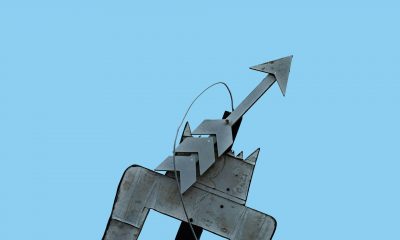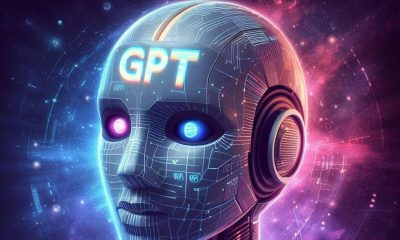

Metaverse
The information wars are about to get worse, Yuval Harari argues – Crypto News
“Let Truth and falsehood grapple,” argued John Milton in Areopagitica, a pamphlet published in 1644 defending the freedom of the press. Such freedom would, he admitted, allow incorrect or misleading works to be published, but bad ideas would spread anyway, even without printing—so better to allow everything to be published and let rival views compete on the battlefield of ideas. Good information, Milton confidently believed, would drive out bad: the “dust and cinders” of falsehood “may yet serve to polish and brighten the armory of truth”.
Yuval Noah Harari, an Israeli historian, lambasts this position as the “naive view” of information in a timely new book. It is mistaken, he argues, to suggest that more information is always better and more likely to lead to the truth; the internet did not end totalitarianism, and racism cannot be fact-checked away. But he also argues against a “populist view” that objective truth does not exist and that information should be wielded as a weapon. (It is ironic, he notes, that the notion of truth as illusory, which has been embraced by right-wing politicians, originated with left-wing thinkers such as Marx and Foucault.)
Few historians have achieved the global fame of Mr Harari, who has sold more than 45m copies of his megahistories, including “Sapiens”. He counts Barack Obama and Mark Zuckerberg among his fans. A techno-futurist who contemplates doomsday scenarios, Mr Harari has warned about technology’s ill effects in his books and speeches, yet he captivates Silicon Valley bosses, whose innovations he critiques.
In “Nexus”, a sweeping narrative ranging from the stone age to the era of artificial intelligence (AI), Mr Harari sets out to provide “a better understanding of what information is, how it helps to build human networks, and how it relates to truth and power”. Lessons from history can, he suggests, provide guidance in dealing with big information-related challenges in the present, chief among them the political impact of AI and the risks to democracy posed by disinformation. In an impressive feat of temporal sharpshooting, a historian whose arguments operate on the scale of millennia has managed to capture the zeitgeist perfectly. With 70 nations, accounting for around half the world’s population, heading to the polls this year, questions of truth and disinformation are top of mind for voters—and readers.
Mr Harari’s starting point is a novel definition of information itself. Most information, he says, does not represent anything, and has no essential link to truth. Information’s defining feature is not representation but connection; it is not a way of capturing reality but a way of linking and organising ideas and, crucially, people. (It is a “social nexus”.) Early information technologies, such as stories, clay tablets or religious texts, and later newspapers and radio, are ways of orchestrating social order.
Here Mr Harari is building on an argument from his previous books, such as “Sapiens” and “Homo Deus”: that humans prevailed over other species because of their ability to co-operate flexibly in large numbers, and that shared stories and myths allowed such interactions to be scaled up, beyond direct person-to-person contact. Laws, gods, currencies and nationalities are all intangible things that are conjured into existence through shared narratives. These stories do not have to be entirely accurate; fiction has the advantage that it can be simplified and can ignore inconvenient or painful truths.
The opposite of myth, which is engaging but may not be accurate, is the list, which boringly tries to capture reality, and gives rise to bureaucracy. Societies need both mythology and bureaucracy to maintain order. He considers the creation and interpretation of holy texts and the emergence of the scientific method as contrasting approaches to the questions of trust and fallibility, and to maintaining order versus finding truth.
He also applies this framing to politics, treating democracy and totalitarianism as “contrasting types of information networks”. Starting in the 19th century, mass media made democracy possible at a national level, but also “opened the door for large-scale totalitarian regimes”. In a democracy, information flows are decentralised and rulers are assumed to be fallible; under totalitarianism, the opposite is true. And now digital media, in various forms, are having political effects of their own. New information technologies are catalysts for major historical shifts.
Dark matter
As in his previous works, Mr Harari’s writing is confident, wide-ranging and spiced with humour. He draws upon history, religion, epidemiology, mythology, literature, evolutionary biology and his own family biography, often leaping across millennia and back again within a few paragraphs. Some readers will find this invigorating; others may experience whiplash.
And many may wonder why, for a book about information that promises new perspectives on AI, he spends so much time on religious history, and in particular the history of the Bible. The reason is that holy books and AI are both attempts, he argues, to create an “infallible superhuman authority”. Just as decisions made in the fourth century AD about which books to include in the Bible turned out to have far-reaching consequences centuries later, the same, he worries, is true today about AI: the decisions made about it now will shape humanity’s future.
Mr Harari argues that AI should really stand for “alien intelligence” and worries that AIs are potentially “new kinds of gods”. Unlike stories, lists or newspapers, AIs can be active agents in information networks, like people. Existing computer-related perils such as algorithmic bias, online radicalisation, cyber-attacks and ubiquitous surveillance will all be made worse by AI, he fears. He imagines AIs creating dangerous new myths, cults, political movements and new financial products that crash the economy.
Some of his nightmare scenarios seem implausible. He imagines an autocrat becoming beholden to his AI surveillance system, and another who, distrusting his defence minister, hands control of his nuclear arsenal to an AI instead. And some of his concerns seem quixotic: he rails against TripAdvisor, a website where tourists rate restaurants and hotels, as a terrifying “peer-to-peer surveillance system”. He has a habit of conflating all forms of computing with AI. And his definition of “information network” is so flexible that it encompasses everything from large language models like ChatGPT to witch-hunting groups in early modern Europe.
But Mr Harari’s narrative is engaging, and his framing is strikingly original. He is, by his own admission, an outsider when it comes to writing about computing and AI, which grants him a refreshingly different perspective. Tech enthusiasts will find themselves reading about unexpected aspects of history, while history buffs will gain an understanding of the AI debate. Using storytelling to connect groups of people? That sounds familiar. Mr Harari’s book is an embodiment of the very theory it expounds.
© 2024, The Economist Newspaper Limited. All rights reserved. From The Economist, published under licence. The original content can be found on www.economist.com
-
Technology1 week ago
XRP Ledger Secures Major Win, Powering China’s Top Supply Chain Firm – Crypto News
-

 De-fi1 week ago
De-fi1 week agoBinance Lists Dolomite’s DOLO Token, Adds Fifth Lira Pair – Crypto News
-

 Technology1 week ago
Technology1 week agoGoogle’s Gemini 2.5 Flash Image does it all – From blurring backgrounds to multi-image fusion – Crypto News
-

 Technology1 week ago
Technology1 week agoGoogle’s Gemini 2.5 Flash Image does it all – From blurring backgrounds to multi-image fusion – Crypto News
-
others1 week ago
Ripple’s RLUSD Launches on Aave’s Horizon RWA Market as Adoption Expands – Crypto News
-
others1 week ago
Ripple’s RLUSD Launches on Aave’s Horizon RWA Market as Adoption Expands – Crypto News
-

 Business4 days ago
Business4 days agoPYMNTS’ Summer of Big Quotes, From Tariffs to Trust Codes – Crypto News
-
Business1 week ago
Gemini Launches XRP Credit Card Amid Ripple-Backed IPO Plans – Crypto News
-
Technology1 week ago
Morgan Stanley Flips to September Rate Cut Call: Here’s What Changed – Crypto News
-
Business1 week ago
BlackRock Buys $300M in Ethereum as Crypto ETF Inflows Return – Crypto News
-

 Blockchain1 week ago
Blockchain1 week agoDecoding Google’s Layer-1 blockchain: what it means and what we know – Crypto News
-

 Blockchain1 week ago
Blockchain1 week agoBitcoin Dives As On-Chain Data Shows Every Cohort Now Selling – Crypto News
-
Business1 week ago
Pi Network Hackathon Winner Hints at Coinbase Listing Amid Pi Open Source Transition – Crypto News
-

 Blockchain1 week ago
Blockchain1 week agoGoogle’s Rich Widmann shares LinkedIn update on Universal Ledger blockchain – Crypto News
-

 Cryptocurrency1 week ago
Cryptocurrency1 week agoPhilippine Senator Suggests Putting National Budget On-chain – Crypto News
-

 Blockchain1 week ago
Blockchain1 week agoAnimoca, Antler’s Ibex Launch Fund to Tokenize Japan’s IP – Crypto News
-
Business1 week ago
Donald Trump Jr.’s VC Firm Invests ‘Millions’ in $1B Crypto Platform Polymarket – Crypto News
-
Business1 week ago
Scott Bessent Says 11 ‘Strong’ Candidates in Line to Replace Fed Chair Powell – Crypto News
-

 Technology1 week ago
Technology1 week agoMint Explainer | A web for machines, not humans: Decoding ex-Twitter CEO Parag Agrawal’s next big move – Crypto News
-

 Cryptocurrency7 days ago
Cryptocurrency7 days agoSouth Korea Busts Hacking Syndicate After Multi-Million Dollar Crypto Losses – Crypto News
-
Business1 week ago
Morgan Stanley Flips to September Rate Cut Call: Here’s What Changed – Crypto News
-
others1 week ago
Breaking: U.S. Government to Begin Issuing GDP Data on Blockchain in Latest Crypto Push – Crypto News
-
Technology1 week ago
Pump.fun Buys Back $58M PUMP Tokens; Price Up 4% – Crypto News
-
Business1 week ago
CR7 Meme Coin Hits $5M Market Cap Then Dumps Following $143M Rug Pull – Crypto News
-

 De-fi1 week ago
De-fi1 week agoCrypto and DeFi in 2026: Adoption, Innovation, and the Road Ahead – Crypto News
-

 Blockchain1 week ago
Blockchain1 week ago215% PENGU Rally Incoming? Analyst Says Token ‘Inches’ From Next Leg Up – Crypto News
-
Cryptocurrency1 week ago
Why Kanye West’s YZY Meme Coin is Down 82% Juts a Week After Launch? – Crypto News
-

 De-fi1 week ago
De-fi1 week agoStablecoins Just Got Real: The Future of Programmable Money in the GENIUS Era – Crypto News
-

 Technology1 week ago
Technology1 week agoPUMP circulating supply shrinks as Pump.fun’s total buybacks surpass $58M – Crypto News
-

 De-fi1 week ago
De-fi1 week agoPrediction Market Kalshi to Expand Onchain Presence – Crypto News
-

 De-fi1 week ago
De-fi1 week agoCircle Mints $500 Million USDC in $250 Million Batches, Hits $25 Billion USDC on Solana in 2025 – Crypto News
-

 Technology1 week ago
Technology1 week agoGoogle is working on Quick Share for iPhone: Here’s everything we know so far – Crypto News
-

 De-fi1 week ago
De-fi1 week agoPantera Capital Seeks $1.25 Billion to Build Solana Investment Vehicle – Crypto News
-

 Technology1 week ago
Technology1 week agoAave’s new Horizon allows institutions to borrow stablecoins using real-world assets – Crypto News
-
others1 week ago
SEC Pushes Back Decision on Grayscale’s Cardano ETF – Crypto News
-

 De-fi1 week ago
De-fi1 week agoPantera Capital Seeks $1.25 Billion to Build Solana Investment Vehicle – Crypto News
-
others1 week ago
Breaking: Canary Capital Files S-1 For Trump Coin ETF With U.S. SEC – Crypto News
-

 Cryptocurrency1 week ago
Cryptocurrency1 week ago5 memecoins positioned to skyrocket as social buzz grows in August – Crypto News
-

 Cryptocurrency1 week ago
Cryptocurrency1 week agoSynthetix price soars 20% amid volume spike: here’s why – Crypto News
-

 De-fi1 week ago
De-fi1 week agoSony’s Soneium Debuts Scoring System to Record Onchain Participation – Crypto News
-

 others1 week ago
others1 week agoGold price in India: Rates on August 26 – Crypto News
-

 others1 week ago
others1 week agoXAG/USD rises toward $39.00 due to increased safe-haven demand – Crypto News
-
Business1 week ago
Donald Trump Jr.’s VC Firm Invests ‘Millions’ in $1B Crypto Platform Polymarket – Crypto News
-
Business1 week ago
MetaPlanet Launches $881M International Stock Issuance for BTC Purchases – Crypto News
-

 Technology1 week ago
Technology1 week agoTrump Media teams with Crypto.com in $100M CRO token deal – Crypto News
-

 others1 week ago
others1 week agoDow Jones slows to a crawl amid quiet markets – Crypto News
-

 Blockchain1 week ago
Blockchain1 week agoFenwick Denies Lawsuit Claiming It Helped FTX Fraud – Crypto News
-

 Blockchain1 week ago
Blockchain1 week agoXRP Shows Strength Amid $3 Retest, But Price Risks Correction – Crypto News
-

 De-fi1 week ago
De-fi1 week agoHYPE Hits New All-Time High as Hyperliquid Dominates DeFi Revenue – Crypto News
-

 Blockchain1 week ago
Blockchain1 week agoChainlink, Commerce Department Bring Data to Blockchain – Crypto News
















